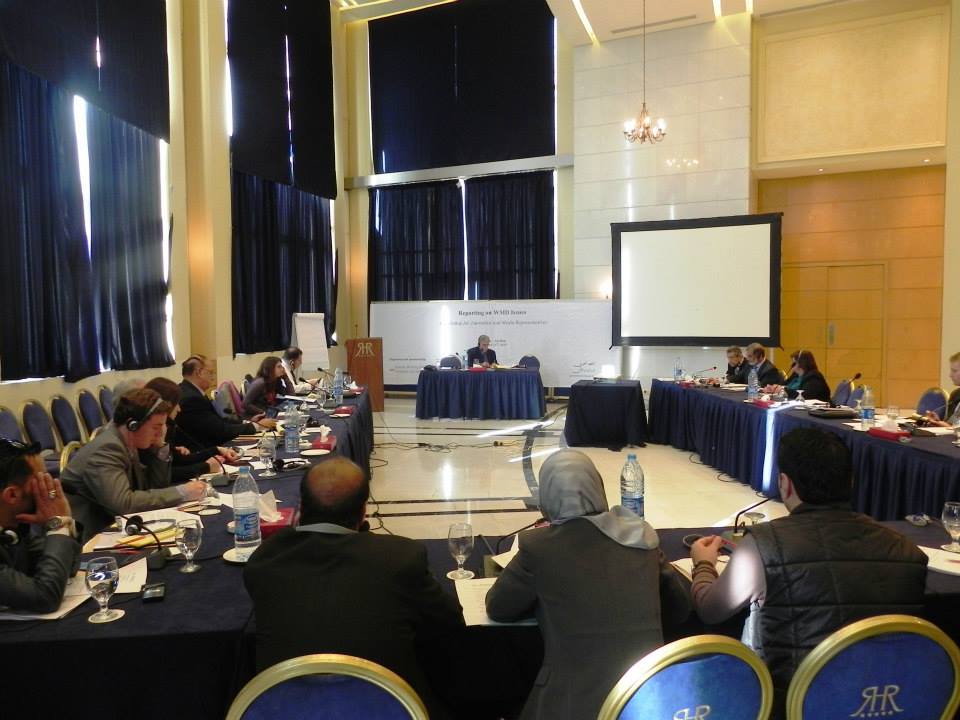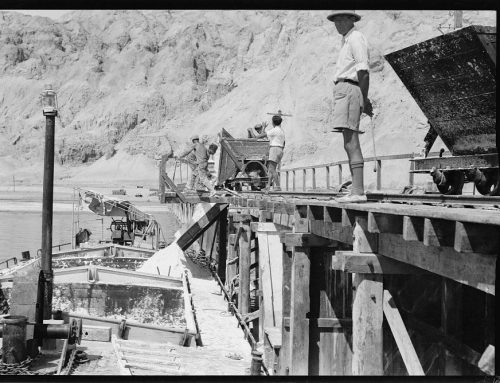
Shirin Lotfi’s research quarter in Jordan included attending an anti-nuclear conference with the Bani Sakhr Tribe. Her trip to Jordan was supported by a Jewish Studies Travel Grant.
The Hashemite Kingdom of Jordan is a moderate Arab friend of the United States and Western Europe. The Kingdom has been a pathfinder in seeking peaceful resolutions to conflicts in the Middle East; this includes, for example, the signing of a peace treaty with neighbor Israel.
For several decades, Jordan has made great efforts and sacrifices to remain a friend of the West and Western governments would do well to remember some of these efforts. For example, it was King Hussein of Jordan who, after meeting with presidents Anwar Sadat and Hafez al-Assad in Alexandria, flew to Jerusalem in 1973 to warn the Israelis of an impending Egyptian-Syrian offensive. Jordan’s limited participation in the war (sending only one brigade to assist Syria) is seen by other Arab states as a betrayal, and has had adverse effects on the Kingdom’s foreign relations. The Kingdom has also assisted the United States with combating terrorism through a cooperative relationship between the CIA and Jordan’s General Intelligence Directorate (GID). This action has been criticized by Jordanians who disagree with such a close relationship with the U.S.
These are just two examples of such sacrifices that Jordan has made to the West and to Western allies. It is understandable, then, that the Hashemite Kingdom would be upset with any Western efforts to curtail their intended nuclear power program.

Senior Shirin Lotfi attended a security colloquium in Amman, Jordan, while interning at the Center for Strategic Studies in Fall 2013.
Since Jordan is one of the poorest countries in terms of natural resources, their plan to build nuclear reactors to produce power drew a lot of attention from neighboring countries. Jordan and Israel share a land border of 238 kilometers, and both countries have been monitoring each other carefully. With nuclear technology, it is always in the best interest of neighboring countries to recognize that the development of such technology could be used to gain nuclear weapons. National security is not about being optimistic; it is about being self-interested and pragmatic. If Jordan appears to possess the ability to produce nuclear weapons, whether they do or not, then how would Israel respond? Does Israel have a reason to be suspicious of Jordan’s program?
For regions in the world that are rapidly developing and reliant on coal or oil imports, nuclear energy is an appealing option for addressing long term growth of demand in power. However, the potential for more states to develop nuclear weapons in the course of their energy production is a frightening possibility that must be addressed.
A case study released by the Jordan Atomic Energy Commission in June of 2010 aptly sums up the reasons why Jordan would like to develop nuclear energy: A growing energy demand, coupled with increasing prices of fossil fuels, compounded by the fact that Jordan is growing increasingly dependent on imported fuel. The last point is of particular concern because of its extraordinary circumstances; Jordan, as of 2010, imports 96% of its fossil fuels. The expense of importation costs the government over 25% of its national budget. Despite the stereotype of the “oil-rich Middle East,” Jordan is quite barren, with one exception: Uranium. There are estimated to be nearly 65,000 to 140,000 tons of Uranium underneath the Jordan soil. At least 65,000 tons of this Uranium was discovered as recently as 2007 and, seeing how the small country has almost no other natural resources, it is not surprising that the Kingdom sees its Uranium reserves as a blessing and an opportunity to move the country towards energy independence.
However, there is more to the issue than just energy independence. The Kingdom would like to use Jordan’s geographical location to their advantage, and become a hub for oil, gas, and electricity networks in the region. Oil and gas may not be in great supply in Jordan, however through nuclear power, electricity would become a newly abundant commodity that Jordan could supply to other countries. The Kingdom views its nuclear program as an opportunity to become an electricity exporter; with hopes to sell to Egypt, Syria, Iraq, Saudi Arabia, and Palestine. The country also intends to solve its growing water crisis by using a reactor to facilitate the operation of a desalinization plant. It has also been argued that there are numerous environmental benefits to be gained from the adoption of nuclear power.

As part of her security studies in Amman, Lotfi attended a conference on weapons of mass destruction.
Finally, the development of the industry will create local jobs and education of workforce, both of which will improve their economy. According to the Jordan Atomic Energy Commission, the Jordanian reactors will create 3000 jobs per reactor (construction phase) and up to 1000 permanent jobs (maintenance, operations, security etc.); the majority of which will be Jordanian. The future of Jordan, as Jordan sees it, depends greatly on this reactor program and the numerous benefits that it will net.
It is not difficult to see the valid points of the argument from a Jordanian perspective. The U.S., nonetheless, will remain concerned about the pursuit of such technology in a region that has been so unstable. From a U.S. perspective, the nuclear issue in Jordan is but a small part of the larger concern of a nuclear Middle East. Whereas the Jordanian argument in favor of nuclear technology is primarily based on economics, the U.S. counter-argument is based on security.
 Shirin Lotfi was born in Tehran, Iran and grew up between Tehran and California. Now a senior at the UW, she is majoring in political science and international security with a minor in Middle East studies. Her focus is energy security within the Middle East. She speaks five languages and is active with the Jewish-American, Arab-American and the Iranian-American community in Seattle. She has a passion for Middle Eastern food, culture, and politics. With the support of the Jewish Studies Travel Grant, she applied for a research internship at the Center for Strategic Studies (CSS) located in Amman to conduct research on the Jordanian nuclear energy program. Currently, she is the community relations coordinator for the Jewish Studies Student Committee at the UW.
Shirin Lotfi was born in Tehran, Iran and grew up between Tehran and California. Now a senior at the UW, she is majoring in political science and international security with a minor in Middle East studies. Her focus is energy security within the Middle East. She speaks five languages and is active with the Jewish-American, Arab-American and the Iranian-American community in Seattle. She has a passion for Middle Eastern food, culture, and politics. With the support of the Jewish Studies Travel Grant, she applied for a research internship at the Center for Strategic Studies (CSS) located in Amman to conduct research on the Jordanian nuclear energy program. Currently, she is the community relations coordinator for the Jewish Studies Student Committee at the UW.







If and when Jordan gains such technology, I am curious to see how this shifts its role in the world. Being energy dependent alone will make great changes in not only politics but I think cultural stigmas as well. For example- look at the changes in the gulf that have occurred over the last 50 years. Could one suspect such changes in Jordan?
The author’s statement “National security is not about being optimistic; it is about being self-interested and pragmatic” is all too true and shakes my own criticism of my country’s National security Agenda.
For Jordan, nuclear power would shift vulnerabiltity to oil and natural gas imports. While nuclear fuel (at least initially) will be wholly imported, it would be cheaper to do so than its equivalent in oil and natural gas imports. For Jordan, nuclear power is just about producing electricity at a lower price and offsetting fluctations in international fossil fuel prices.
The biggest sticking point will be the right to produce nuclear fuel (whether through enrichment or reprocessing); which is what the US and presumably Israel would be most concerned about.
Jordan and the US have not signed an Nuclear Cooperation Agreement (NCA) because the US wants Jordan to give up on the right to produce nuclear fuel -especially reprocessing- which can be diverted to nuclear weapons production.
However, Jordan insists that it needs a ‘back-door’ option to produce nuclear fuel; or to potentially export nuclear fuel; (particularly with significant uranium reserves) in the future; it would be a big lost opportunity. By following the UAE and South Korea, Jordan would have an open-nuclear cycle that is vulnerable on a potentially lucrative market.
I really enjoyed this article because Shirin presents this complex issue as exactly that: a complex issue with many different and equally valid perspectives. As someone coming from a non-Jordanian standpoint and is deeply concerned about the security of the region I agree with the U.S. and the other countries who view nuclear development in Jordan as a security risk. However, reading this article and examining the economic benefits nuclear power could bring to Jordan has expanded and refined how I think about this subject.
Great read! I’d definitely like to see a follow-up piece sometime examining how the events of this past summer have affected the discussion here. I can’t imagine that the successes of Daesh, for instance, have made the Jordanians’ arguments any easier.
Would it be feasible for Jordan to operate their proposed desalinization plant even without nuclear power? How dire is the water crisis now? I’m not asking these things as leading questions; I sincerely don’t know as much I would like to. I’ve also just seen way too many articles lately on the significance of the drought in Syria as one of the great underappreciated causes of the civil war there.
Great article. Considering the degree to which Jordan is currently reliant on outside resources and foreign aid, it’ll be interesting to see how its role in the Middle East will change when (if?) it reaches its goals with nuclear energy.
I guess the real concern is what happens if there’s a regime change. Same question I pose about other powerful Arab administrations within the region: Egypt, Saudi Arabia.
None the less, I liked the article a lot. Very insightful, clearly the writer knows her stuff.
Though only experts in the field know it, there is another hidden agenda when it comes to nuclear power in sensitive regions. A nuclear plant, once live, could kill many thousands if not hundreds of thousands of citizens depending on wind patterns etc. and the type of attack. Being a neighbor to Israel, Israel cannot attack a Jordanian nuclear power plant once it has gone live and thus has radioactive inventory beyond the primal uranium load. The same seems to be the reasoning behind Iran’s similar activities, though they are on a grander scale. While Israel reacted preemptively and successfully destroyed Iraq’s Osirak reactor just before it was going to be commissioned, which was still “safe”, Israel is too late with respect to Iran. All the threats are just sabre-rattling. If Jordan, even if it does not build its own enrichment capacities and never builds a bomb, gets a nuclear power plant up and running, Israel’s military options are much curtailed.
Clear cut, straight to the point and informative and accessible for anyone to read. A good article, I didn’t know Jordan had an abundance of uranium.